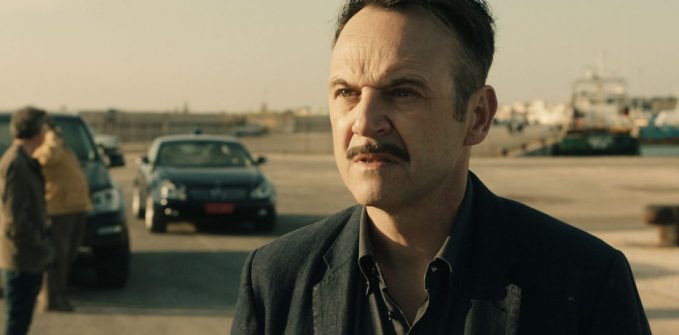A dramatic fictional feature on the hot-button topic of illegal immigration, directed by an experienced documentarian, sounds like a can’t-miss proposition. What The Order of Things delivers instead is a disappointment, largely lacking in the satisfactions of traditional film storytelling, while also falling some way short of the urgency that a documentary approach may have brought.
Leading us through the world of this film is the character of law enforcement officer Corrado, seen enjoying family life and material comforts in Italy before jetting away to Libya (a former Italian colony) on field assignment in his position with immigration control. Upon arrival in North Africa, the discoveries and connections that are made whilst inspecting a detention centre compel Corrado’s personal involvement in the fate of one particular refugee.
Such a plot synopsis, accurate though it may be, implies far more interest and intrigue than can be found in The Order of Things. Director/co-writer Andrea Segre – in what is apparently his third non-docu effort to date – certainly does not lack for artistry or technical skills. Indeed, from the opening frame, it is clear that the film-maker has an eye for elegant compositions and patient observation. Music is credited to Sergio Marchesini, but it was virtually undetectable; certainly no one could accuse the film of attempting to blatantly manipulate viewers’ emotions by artificial means, like so many Hollywood stories do.
Unfortunately, while the title may have been intended as an ironic comment on entrenched middle-class attitudes toward foreigners fleeing war and/or poverty in their country of origin (and perhaps an additional comment on the impotence that authorities feel in the face of such an enormous and difficult problem), ‘order’ is, in the end, really what this particular film has just a little too much of for its own good. Understatement combined with intelligence is certainly a good idea in theory, but Segre’s approach here results in audience anticipation for a compelling drama that never quite arrives.
Given the parameters that they’ve been directed within, performances are solid at worst and outstanding at best. Paolo Pierobon exudes a quietly magnetic charisma in the central role, with Giuseppe Battiston also registering strongly in the supporting cast.
Italian film artists have, in recent years, proven themselves, on multiple occasions, to be capable of dealing with the ‘immigrant issue’ in ways both entertainingly engrossing (Terraferma, 2011) and intriguingly poetic (Fire at Sea, 2016). The Order of Things, by contrast, is a work of noble intentions that promises far more than it actually achieves.
The Order of Things screens as part of the Lavazza Italian Film Festival at Palace Nova Eastend and Prospect. Festival runs until October 14th.
For further information and screening times, click here.























